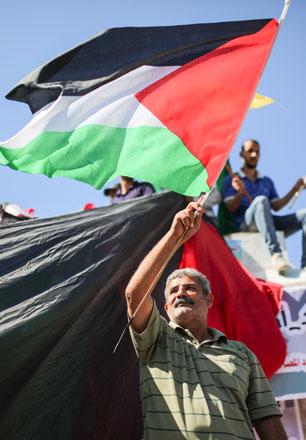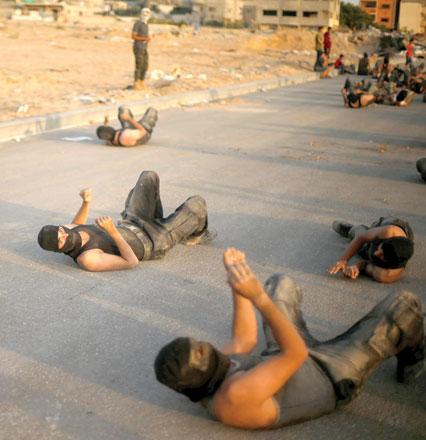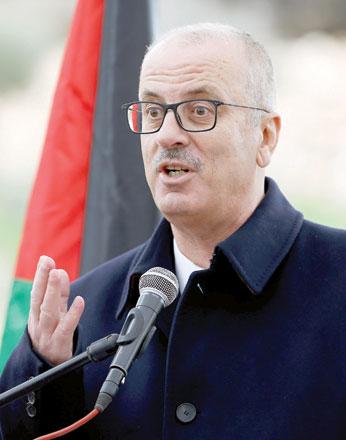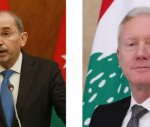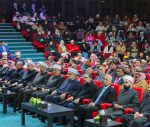You are here
Fateh-Hamas: a decade-old split
By AFP - Jan 30,2019 - Last updated at Jan 30,2019
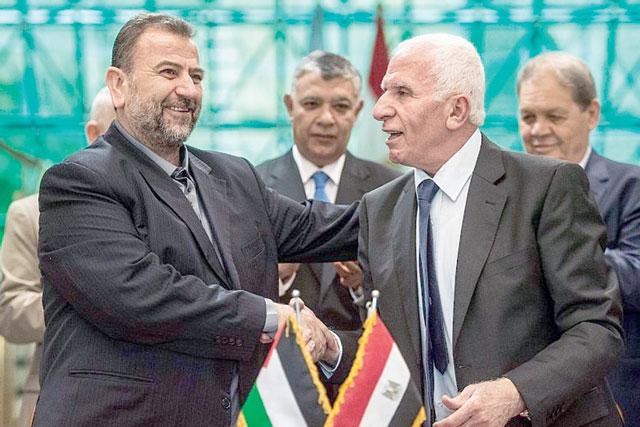
Hamas' Saleh Al Arouri (left) and Fateh's Azzam Al Ahmad seal the reconciliation deal with a firm handshake in Cairo, on October 12, 2017 (AFP photo)
RAMALLAH, Palestinian Territories — The two rival Palestinian movements, the secular Fateh and Islamist Hamas, have been at daggers drawn for more than a decade.
While Fateh dominates the internationally recognised Palestinian Authority, which is based in the West Bank, Hamas is in control in the Gaza Strip.
Here is a look back at the history of the dispute:
Islamists win at the polls
In 2006 Hamas takes part in elections for the Palestinian parliament for the first time, sweeping to a landslide victory over Palestinian president Mahmoud Abbas's Fateh, which had dominated it since it was established.
In March a unity government is installed, with Hamas taking key posts, but it is dogged by international demands that they renounce violence, as well as recognise Israel and past peace deals. The Islamists reject these demands.
Hamas seizes Gaza
In early 2007 deadly clashes erupt between the rival factions in Gaza.
After a week of violence in June, Abbas dismisses the unity government and declares a state of emergency in the territory.
But Hamas fighters rout pro-Abbas forces and take control, a move Abbas calls a coup.
Reconciliation stillborn
In April 2011, Fateh and Hamas say they have reached an understanding to create an interim government to prepare for elections, but implementation is repeatedly delayed.
In February 2012 the two movements agree that Abbas should lead an interim government, but the deal is disputed within Hamas and never implemented.
In April 2014, Fateh strikes a reconciliation accord with Hamas.
A unity government is sworn in, in June, but fails to exercise authority over Gaza and falls apart months later.
Pragmatism
In May 2017, Hamas issues a new policy document, easing parts of its stance on Israel.
Still blacklisted as a terrorist organisation by the United States and the European Union as well as Israel, it says its struggle is not against Jews but against Israel as an occupier. It accepts the creation of a Palestinian state in the West Bank, East Jerusalem and Gaza, the territories occupied by Israel in the Six-Day War of 1967.
It did not, however, renounce violence.
Pressure
Tensions rise over the formation by Hamas in March 2017 of an ‘‘administrative committee’’ in Gaza, which is seen as a rival Palestinian government.
Abbas puts the squeeze on Hamas by cutting payments for electricity supplies and civil servants' salaries to the territory.
Hamas in September dissolves the committee.
On October 12, the two sides announce they have reached a new reconciliation deal in Cairo, under which Hamas agrees to cede power in the Gaza Strip to the Palestinian Authority.
The first deadline of the agreement is met, with Hamas handing over control of Gaza's borders to the Palestinian Authority on November 1.
But the two sides remain sharply at odds over the police in the Gaza Strip and the future of Hamas's armed wing, with Hamas refusing to lay down arms.
On February 1, 2018 they miss a deadline for solving the crucial issue of two rival civil services.
Bomb attack
On March 13, Palestinian Authority prime minister Rami Hamdallah survives a bomb attack on his convoy during a rare visit to Gaza.
Abbas later accuses Hamas of plotting the attack, and announces sanctions against the movement. Hamas denies the claims.
Government resigns
On December 22, 2018, Abbas says he intends to dissolve the Hamas-controlled Palestinian parliament, following a court decision ordering the move. Hamas opposes the decision.
On December 26, 2018, Palestinian security forces prevent a news conference in the West Bank by parliament speaker, Aziz Dweik, a Hamas member.
On January 6, the Palestinian Authority says it is withdrawing staff from the Rafah border post with Egypt in the southern Gaza Strip to protest against ‘‘brutal practices’’ by Hamas.
On the 27th the Fateh central committee recommends the formation of a new government that would comprise members of the Palestine Liberation Organisation, of which Hamas is not part.
On January 29, the Palestinian government submits its resignation.
Related Articles
OCCUPIED JERUSALEM — Israel’s government decided Tuesday not to negotiate with a Palestinian unity government that includes Hamas if the Isl
GAZA CITY, Palestinian Territories — Hamas' leader in the Gaza Strip said Thursday "no one" can force it to disarm or recognise Israel, afte
RAMALLAH, Palestinian Territories — Palestinian Prime Minister Rami Hamdallah offered to resign on Monday, as President Mahmoud Abbas seeks


